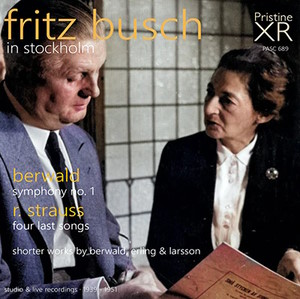
Fritz Busch (conductor)
In Stockholm
Franz Berwald (1796 – 1868)
Estrella de Soria – Overture
Symphony No. 1 “Symphonie sérieuse”
Erik Erling (1894-1966)
Intermezzo
Lars-Erik Larsson (1908-1986)
Ostinato from Symphony No. 2
Richard Strauss (1939-1951)
Four Last Songs
Sena Jurinac (soprano)
Konsertförenings Orkester, Kungliga Orkester, Stockholm Radiotjaensts Symfoniorkester
rec. live & studio, 1939-1951
Ambient Stereo XR remastering
Pristine Audio PASC689 [69]
Here is an attractive compilation of recordings by Swedish Radio of nearly seventy minutes of Swedish music played by Swedish orchestras and Strauss’ famous valedictory song cycle, the Four Last Songs, under the baton of celebrated German conductor Fritz Busch, who maintained close connections with Danish and Swedish orchestras after his expulsion from Germany as an avid anti-Nazi. The Strauss songs and Berwald’s First Symphony are the main items here; there is no shortage of recordings of the songs or the symphony, which has been frequently recorded by Scandinavian conductors, but a special interest lies in the fact that they were both recorded in 1951, the year of Busch’s unexpected death from a heart attack, aged only 61. Their being rendered from mono into Ambient Stereo lends them yet more appeal, especially as Pristine’s XR remastering is almost invariably transformative.
The Berwald overture is very Beethovenesque in its sense of drama, with elements of Weber, Strauss and Mendelssohn intertwined; a lot is packed into seven minutes and if the 1946 sound is still a bit crumbly, it is still highly listenable and the verve and attack of the performance are infectious. Thrilling stuff which should be more widely heard. The symphony from 1951 is similarly volatile and energised – no wonder Berwald marked it “con energia”; the alternately febrile and lyrical nature of the music is almost startlingly bipolar but rather fun. Berwald’s employment of parping trombones at the close of the first movement is especially startling. The Adagio is bold and sweeping and Busch embraces its whole-hearted Romanticism enthusiastically. The Scherzo, marked “Stretto” (tight, firm) is coruscating, displaying some very virtuosic orchestral playing and for some reason to my ears anticipatory of Nielsen in its restlessness and momentum – and its unresolved ending is intriguing. The finale is a bit of a hodgepodge but very entertaining when played with such commitment and vigour and Berwald’s use of brass at the close is once more almost scary. Again, the sound, despite Pristine’s best efforts, is harsh and peaky but tolerable.
The Erling piece is sonically primitive and perhaps negligible, musically speaking, but interesting. Larsson’s Ostinato is a reworking of the finale of his Second Symphony and is another highly coloured piece; the sound is a congested but the music very exciting.
In my survey of Strauss’ songs, I praised this account highly while lamenting the relative inadequacy of its sound; Pristine has reprinted my findings (as follow) on their website in order to emphasise the quality of the performance and the fact that only its inadequate sound prevented it from being a top recommendation:
“This was a voice that acknowledged few boundaries and could do so because it was so evenly and perfectly produced over its extended tessitura. It is invariably beautiful, without the blandness too often attendant on the singing of an artist too concerned with beauty of sound alone; there is always a hint of smokiness in the tone and she has the happy knack of injecting feeling into the notes without disrupting the line.
The Stockholm performance here gives us a fair idea, despite the limited mono sound, of the gleam and soaring power of Jurinac’s voice. She reminds me somewhat of Lisa Della Casa (another great soprano born the year after Jurinac) in the aristocratic poise and purity of her sound; how I would have liked to have heard them sing Der Rosenkavalier together. When Jurinac spins out the great phrase on “Und die Seele, unbewacht” her artistry is enough to forget at least momentarily the inadequacies of the recorded sound. As a non-fan of a certain celebrated contemporary of Jurinac who made two famous studio recordings of these songs, I was amused by noted musical biographer Tully Potter’s description of Jurinac’s account as “proper, honest-to-goodness singing rather than the ghastly crooning affected by a much-touted rival.” That should put a good few backs up…but I know what he means. If it were in better sound it would doubtless more often top the list of favourite recordings of these songs.”
Certainly, the sonic improvement by Pristine is welcome and admirable but the sound remains papery, hissy and slightly distorted, despite the enhancement. On the other hand, I marvel afresh at the vibrancy and tonal effulgence of Jurinac’s soprano and the warmth of Busch’s conducting. It is odd but not especially surprising that the audience applauds each song. Busch’s speeds are quite brisk but that suits the straightforward, emotional directness of Jurinac’s singing and the sheer, effortless effulgence of her tone. It is still not sufficiently sonically appealing to be a first choice but should always be considered as a supplement.
Ralph Moore
Availability: Pristine Classical
Details
1. BERWALD Estrella de Soria – Overture
Konsertförenings Orkester
Stockholm, Konserthuset (broadcast live performance), 29 September 1946
2. ERLING Incidental music to Kejsarn av Portugallien – Intermezzo 7b: Värmlandssången
William Damme, violin; Carl Thelin, violoncello; members of the Kungliga Orkester
Stockholm, Church of Hedvig Eleonora, 20 November 1939
3. LARSSON Symphony No. 2 op. 17 – 3rd mvt. – Ostinato (
Stockholm Radiotjaensts Symfoniorkester
Stockholm, Konserthuset (broadcast live performance), 4 December 1949
BERWALD Symphony No. 1 in G minor, ‘Symphonie sérieuse’
Konsertförenings Orkester
Stockholm, Konserthuset (broadcast live performance), 2 May 1951
R. STRAUSS Four Last Songs
Sena Jurinac, soprano; Konsertförenings Orkester
Stockholm, Konserthuset (broadcast live performance), 2 May 1951


















